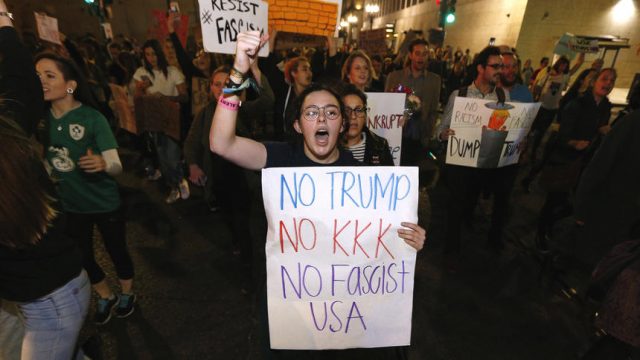Clay Routledge: Compassion for Those Who Need Help, but Skepticism for Culture of Victimhood

Protesters demonstrate against the election of Republican Donald Trump as President of the United States in New Orleans, Louisiana, U.S. November 10, 2016. REUTERS/Jonathan Bachman
I was recently interviewed by a reporter at the Forum on a story about colleges offering counseling services for students after the presidential election. I voiced my support for services to anyone who has been targeted and victimized. As a social psychologist who has researched and teaches about prejudice and discrimination, I am very concerned about these social ills.
That being said, I also voiced my concerns about what a number of scholars have referred to as a growing victimhood culture on college campuses. I have been writing about this concern for some time, long before the recent election. The basic idea is that colleges are coddling students, treating them like they are psychologically fragile. The truth is that humans are naturally very resilient. There is a large body of research showing that people are generally quite good at recovering from hardship and loss and able to find meaning and purpose from some of life’s most challenging experiences.
It wasn’t lost on me that I was being interviewed on Veteran’s Day. As one reader wrote to The Forum, “I don’t remember grief counselors being offered or needed in the ’60s when so many of us were facing the draft, going to Vietnam and possibly losing our life. I went, I served and was lucky to return unharmed but so many didn’t.”
[mks_pullquote align=”left” width=”300″ size=”24″ bg_color=”#ffffff” txt_color=”#000000″]The Western world is safer than ever, yet some claim that young people are more depressed and anxious than ever. Are we sending the wrong message to young people that they should be focused inward on their own insecurities instead of outward on the many pressing problems our world faces, problems that could ultimately make the world less safe?[/mks_pullquote]
The Western world is safer than ever, yet some claim that young people are more depressed and anxious than ever. Are we sending the wrong message to young people that they should be focused inward on their own insecurities instead of outward on the many pressing problems our world faces, problems that could ultimately make the world less safe?
Before pursuing my present career as an academic, I worked for a couple of years in social services and can say that I have seen people who are truly hurting and broken. I have worked with the most vulnerable people in our communities. American colleges are some of the safest and most privileged places on the planet. If you get to step foot on a college campus every day and it is not to clean the toilets, you won the lottery. Most people in the world are not afforded the opportunity to get a college education. I am not advocating for ignoring or minimizing legitimate cases of victimization and mental distress. I am, however, championing the power of psychological resilience and gratitude, that most people have the inner strength to cope with life’s stressors and setbacks and find a way to be thankful for and seize upon the opportunities they have.
Some have argued that the growth of the victimhood culture has corresponded with the growth of the administrative class at colleges around the nation. I do not know local numbers but nationally the growth of administration is far outpacing the growth of the faculty. This has raised questions about the purpose of college. Do we want colleges to provide an increasing number of social and psychological services, or do we want them to focus on education and scholarly research? Are students living in one of the freest and safest countries really in desperate need of mental health services? Or are we overpathologizing, treating normal anxieties and insecurities as being indicative of true mental illness? These are fair questions. After all, higher education is becoming increasingly expensive, making a college education less accessible to kids from middle class, working class, and poor families.
I will reiterate that I very much support the need to think about how to best serve marginalized and vulnerable populations. I also think it is fair and important to question whether colleges are overreaching and potentially promoting psychological fragility. Most parents know it is difficult to balance supporting and protecting our kids with teaching them how to pick themselves up after they fall and find their own strength to move forward. After all, we can’t care for them forever. Likewise, college is a temporary stop on the road of life, a stop most people in the world don’t get to make.




